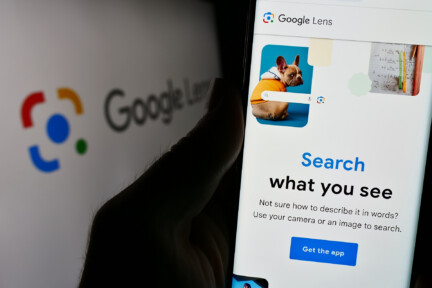Artificial Intelligence in healthcare isn’t just a trend — it’s a paradigm shift, and it’s reshaping the very foundation of medical care.
The AI healthcare market is expected to expand at a CAGR of 36.4% from 2024 to 2030. This rapid growth signifies a substantial evolution in our approach to healthcare.
We will discover how artificial intelligence is used in healthcare, including:
- AI’s groundbreaking impact on diagnostics and patient care
- Optimizing healthcare efficiency through AI-driven solutions
- AI’s role in accelerating medical research
- Challenges and opportunities in AI integration in healthcare
- Case studies showcasing AI technology in healthcare
- What the future of AI in healthcare looks like
P.S., At Miquido, we’re not just observing this revolution — we build it. We’re actively shaping the future of industries like healthcare with AI, bringing innovative solutions that resonate with today’s challenges. Looking to get started? Get custom AI mobile apps, chatbots, and infrastructure to streamline your healthcare operations.
How AI is Used in the Healthcare Industry Today
In the fast-paced world of business and technology, Artificial Intelligence (AI) has become a cornerstone, reshaping industries from finance to manufacturing. AI in the healthcare industry is no exception, transforming how we approach everything from patient care to diagnostics and long-term health outcomes.
Here are a few ways AI is being used in the healthcare system:
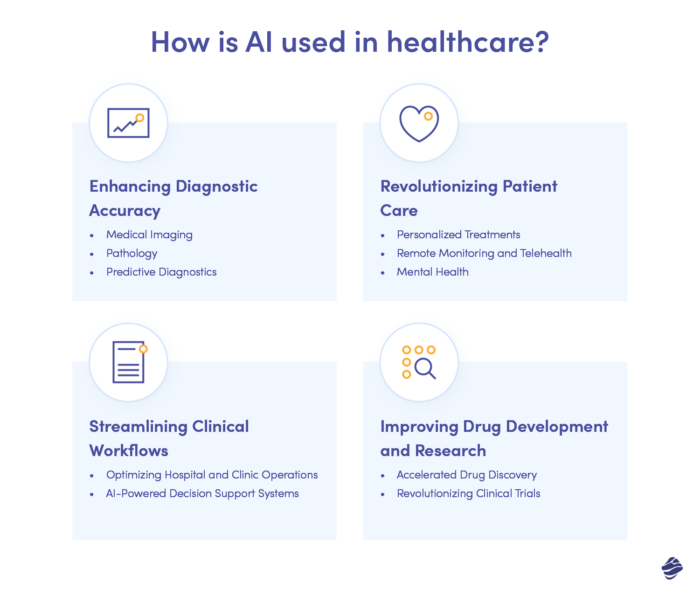
- Enhancing Diagnostic Accuracy
- Medical Imaging
- Pathology
- Predictive Diagnostics
- Revolutionizing Patient Care
- Personalized Treatments
- Remote Monitoring and Telehealth
- Mental Health
- Streamlining Clinical Workflows
- Optimizing Hospital and Clinic Operations
- AI-Powered Decision Support Systems
- Improving Drug Development and Research
- Accelerated Drug Discovery
- Revolutionizing Clinical Trials
1. Enhancing Diagnostic Accuracy
One of AI’s most notable impacts on the healthcare industry comes from enhancing diagnostic accuracy. In Britain’s NHS, for instance, a significant 34% of AI use cases are diagnostic-related. This substantial figure underscores AI’s critical role in providing more accurate diagnoses of severe illnesses.
Medical Imaging
Healthcare professionals are increasingly using AI algorithms for analyzing medical images such as X-rays, MRIs, and CT scans. These machine-learning algorithms play a critical role in diagnosing conditions with unparalleled precision. They’re capable of detecting subtleties in images that might be missed by the human eye, offering a new level of accuracy in medical diagnosis.
Pathology
Pathology analysis is an excellent example of how medical professionals are using AI to solve some of the healthcare sector’s hardest problems. AI supports the analysis of tissue samples, using deep learning techniques to optimize the process of cancer diagnosis. This technology is crucial for improving patient health outcomes, considering the intricate and time-sensitive nature of cancer detection.
Predictive Diagnostics
AI systems are being developed to predict diseases based on extensive medical data, histories, and electronic health records. This proactive approach to healthcare, leveraging machine learning, is a game-changer, potentially identifying health issues before they manifest symptomatically and empowering medical professionals to act early.
2. Revolutionizing Patient Care
AI is not just changing how we diagnose but also transforming the very essence of patient care, making it more personalized, proactive, and accessible.
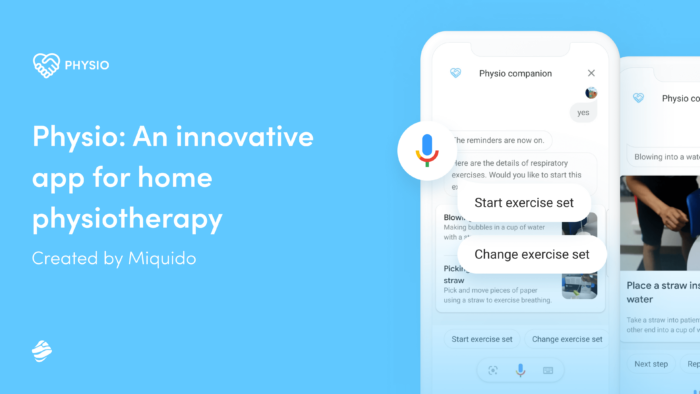
Personalized Treatments
AI’s capability to analyze a patient’s genetic profile, lifestyle, and health data is revolutionizing precision medicine and treatment. It enables healthcare organizations to create treatment plans that are not just ‘one size fits all’ but are uniquely tailored to each individual and their medical history.
Remote Monitoring and Telehealth
With AI-powered healthcare apps and devices, remote monitoring of patients, especially those with chronic conditions, has become more efficient and effective.
Miquido‘s expertise in mobile app development has enabled the creation of sophisticated tools that provide continuous health data to healthcare providers. These tools allow healthcare workers to track patient health in real-time and intervene promptly when necessary, enhancing patient safety.
AI is also expanding the capabilities of telehealth. By incorporating AI into telehealth platforms, patients receive personalized advice and monitoring tailored to their specific health needs. This is particularly beneficial in regions with limited access to healthcare facilities, democratizing healthcare access.
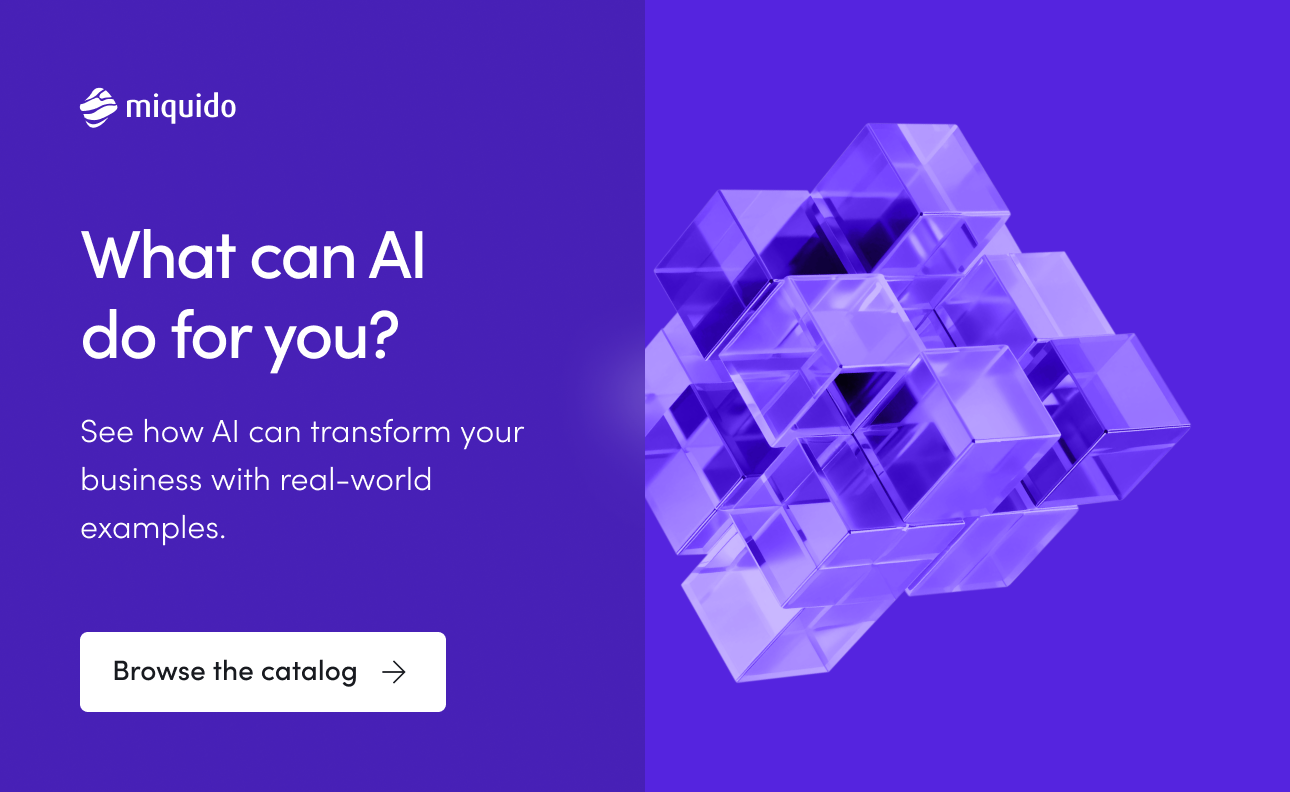
Mental Health
In mental healthcare, AI is breaking new ground. Chatbots and virtual assistance are prime examples of artificial intelligence accelerating the healthcare industry, offering new forms of support for managing mental health conditions like depression and anxiety. These AI tools provide 24/7 assistance, which is especially valuable in mental health care scenarios where timely support is crucial.
Miquido’s innovative chatbot development offers personalized interactions, making medical support more accessible and less intimidating. By developing chatbots that can understand and respond to various needs, Miquido is opening new avenues for patient care.
3. Streamlining Clinical Workflows
AI’s impact on healthcare workflows is profound, addressing some of the most pressing challenges in healthcare delivery.
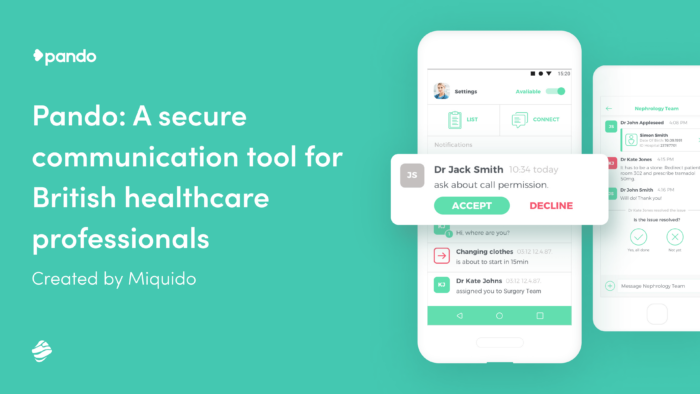
Optimizing Hospital and Clinic Operations
Artificial intelligence is revolutionizing how healthcare institutions and clinics operate. With 47.5% of health systems using AI to tackle workforce challenges, it’s clear that AI is a vital tool in enhancing healthcare delivery. AI streamlines workflows by: intelligently scheduling patient appointments, allocating resources, and managing staff schedules for healthcare providers.
AI-Powered Decision Support Systems
With AI’s predictive analytics, healthcare providers can foresee potential complications, allowing for proactive interventions based on medical history and patient data. This not only gives better health outcomes but also reduces the burden on healthcare systems.
4. Improving Drug Development and Research
The role of AI in the drug development process and clinical trials is growing increasingly pivotal, especially in regions leading in AI adoption like the USA, Europe, and the UK.
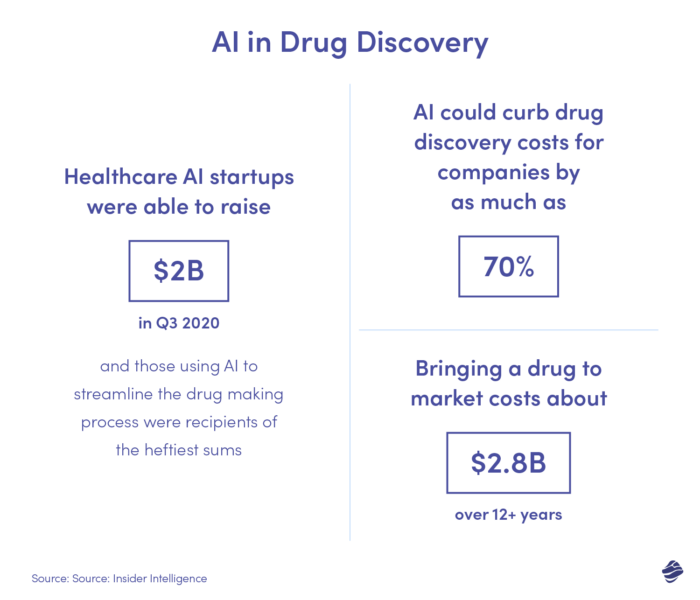
Accelerated Drug Discovery
The USA, with 55.10% of healthcare organizations, followed by Europe (19.90%) and the UK (9.95%), is at the forefront of adopting AI in drug discovery. Deep learning algorithms significantly reduce the time and cost associated with drug development by predicting how different drugs will interact with various biological targets.
Revolutionizing Clinical Trials
AI is transforming the design and monitoring of clinical trials. By identifying the most suitable candidates for trials and predicting the effectiveness of treatments, AI is ensuring more efficient and effective clinical trials. This integration of data science in healthcare research is exemplified by projects undertaken by institutions like Harvard Medical School, pioneering the use of AI in advancing medical knowledge.
Real-World Examples and Case Studies: AI in Healthcare
The application of AI in healthcare organizations is not just theoretical; it’s already making a real impact. Here are three notable software examples of how AI is used in the healthcare industry:
1. Noom: Personalized Health Coaching
- Overview: Noom is an AI-based healthcare mobile app specializing in weight management and overall health improvement.
- AI Application: The app utilizes machine learning algorithms to offer personalized coaching and support, adapting to users’ unique health goals and preferences.
- Impact: By delivering tailored guidance and motivation, Noom helps users achieve sustainable health and lifestyle changes.
2. Buoy: Intelligent Symptom Diagnosis
- Overview: Buoy is an AI-powered healthcare app designed to assist users in diagnosing symptoms and finding appropriate treatments.
- AI Application: The app employs natural language processing and machine learning to provide personalized medical recommendations, based on user-reported symptoms.
- Impact: Buoy simplifies the process of understanding symptoms and seeking appropriate care, making healthcare more accessible and user-friendly.
3. Physio: Revolutionizing Home Physiotherapy
- Overview: In a collaborative project with Centro Clinico Nemo, Miquido’s R&D team developed Physio, an action for Google Assistant.
- AI Application: Physio focuses on making daily exercise accessible for those with neuromuscular disorders, offering a range of voice-guided exercises and instructional videos.
- Impact: Physio makes home physiotherapy accessible by providing customized exercise routines and addressing the scarcity of physiotherapists, aiding patients and caregivers alike.
Challenges and Limitations of AI in Healthcare
While AI presents a new chapter in healthcare, there are important challenges and limitations that healthcare leaders and innovators must recognize and address.
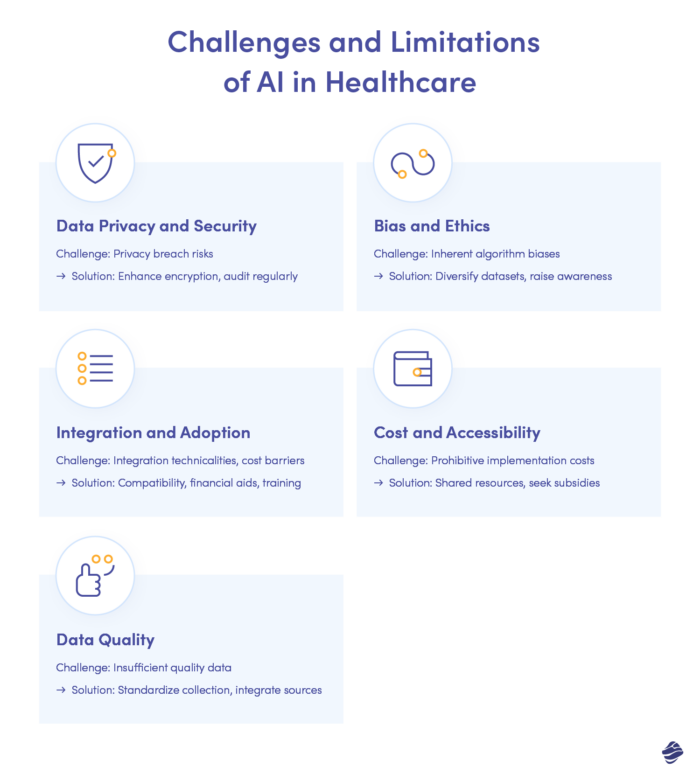
Data Privacy and Security
Challenge: Privacy breach risks.
Solution: Enhance encryption, audit regularly.
Bias and Ethics
Challenge: Inherent algorithm biases.
Solution: Diversify datasets, raise awareness.
Integration and Adoption
Challenge: Integration technicalities, cost barriers.
Solution: Compatibility, financial aids, training.
Cost and Accessibility
Challenge: Prohibitive implementation costs.
Solution: Shared resources, seek subsidies.
Data Quality
Challenge: Insufficient quality data.
Solution: Standardize collection, integrate sources.
Data Privacy and Security Concerns
Challenge: Managing sensitive patient data by AI systems raises serious privacy and security concerns. Medical records management is already a challenge for many healthcare providers, and its use by AI may cause patients concern. That means ensuring robust data protection to maintain patient trust and comply with healthcare regulations like HIPAA and GDPR.
Solution: Implementing advanced encryption methods and secure data handling protocols is crucial. Regular audits and compliance checks should be conducted to ensure that AI systems adhere to the latest privacy standards. Additionally, investing in cybersecurity training for healthcare staff can significantly reduce healthcare data breaches.
Bias, Ethics, and Public Perception
Challenge: The use of artificial intelligence in the healthcare industry faces the risk of perpetuating existing biases and causing ethical dilemmas. With 60% of Americans believing AI will not improve health outcomes, and another 60% feeling uncomfortable with healthcare providers relying heavily on AI, addressing these biases and ethical concerns becomes even more crucial.
Solution: Develop AI algorithms using diverse datasets to minimize bias. Regular ethical reviews and adjustments to AI systems can help align them with evolving ethical standards. Public awareness campaigns highlighting AI’s benefits in healthcare can also help improve public perception and trust.
Integration and Adoption Challenges
Challenge: Integrating AI into existing healthcare infrastructures can be technically and financially challenging, with resistance among healthcare professionals adding to the complexity.
Solution: Tailoring AI solutions to be compatible with existing systems and providing financial support for upgrades can ease integration. Conducting workshops and training sessions for healthcare professionals can help dispel misconceptions and encourage adoption.
Cost Implications and Accessibility
Challenge: The high costs associated with implementing and maintaining AI solutions pose a significant barrier, especially for smaller healthcare organizations. The investment required for advanced AI technology, including the necessary infrastructure and expertise, can be prohibitive for many institutions.
Solution: Explore collaborative models to share AI resources, easing individual financial burdens. Pursuing government grants and subsidies also offers vital support. Key to this is Miquido‘s role in creating scalable and efficient AI systems. Miquido’s expertise in customizing AI solutions ensures that organizations of all sizes can access advanced technology, making AI an inclusive tool for enhancing healthcare delivery.
Data Quality and Availability
Challenge: AI algorithms require large volumes of high-quality data to function effectively, but healthcare organizations often face challenges in obtaining, storing, and utilizing such data.
Solution: Encouraging standardized and secure methods of data collection and storage can help improve health data quality and accessibility. Additionally, incorporating data from multiple sources can provide a more comprehensive view of a patient’s health and improve the accuracy of AI-driven diagnoses. Miquido’s experience in data engineering and management ensures that organizations have access to robust and reliable data sets for AI implementation.
The Future of AI in Healthcare: A Transformative Outlook
The horizon of healthcare is rapidly evolving, and at the heart of this transformation is the integration of AI. As we look ahead, the potential applications and advancements in AI promise to reshape healthcare in several key areas:
- Genetic-Based Customization: AI’s integration with genomic health data will direct an era of ultra-personalized medicine, where treatments are tailored to an individual’s genetic blueprint.
- Predictive Health Models: Leveraging AI for predictive analytics will enable healthcare providers to foresee and act on health risks before they manifest, shifting the focus to preventive care.
- Smart Diagnostic Devices: Combining AI with Internet-of-Things (IoT) will revolutionize diagnostic tools, providing continuous, real-time health monitoring through advanced wearables and smart devices.
- Augmented Reality Diagnostics: Incorporating AI with augmented reality (AR) will offer healthcare professionals new, intuitive ways to diagnose conditions, enhancing accuracy and efficiency.
- Automating Operations: AI will continue to refine healthcare operations, from optimizing patient schedules to managing medical supplies and improving overall service delivery.
- Intelligent Medical Records: The transformation of traditional health records into AI-driven electronic health records will ensure more efficient management of patient data, leading to more informed healthcare decisions.
- Enhanced Virtual Therapy: AI’s advancements will introduce more sophisticated virtual therapy options, providing accessible mental health support across various demographics.
- Developing Ethical AI Systems: The growing prevalence of AI in healthcare will necessitate a stronger emphasis on ethical AI development, prioritizing patient privacy and data security.
- Navigating the Regulatory Terrain: As AI becomes more ingrained in healthcare, regulatory frameworks will evolve to ensure its safe and responsible utilization.
Miquido’s Insight: Miquido’s vision for the future of AI in healthcare is one where technology and human expertise converge to create a more responsive, efficient, and patient-centered healthcare experience. In this evolving landscape, Miquido keeps you ahead of the curve by developing innovative AI solutions tailored to the emerging challenges and needs of your healthcare organization.
Empower Your Healthcare Journey with Miquido’s AI Expertise
As we’ve explored the vast landscape of AI in healthcare, it’s clear that this technology is not just a fleeting trend, but a fundamental shift in how we approach health and wellness. From enhanced diagnostics to personalized patient care, AI is the catalyst for a new era in healthcare.
Key Takeaways:
- AI’s role in enhancing diagnostic accuracy and medical imaging is transforming patient care.
- Predictive diagnostics using AI marks a shift towards proactive healthcare management.
- Personalized medicine, powered by AI, is tailoring treatments to individual patient needs.
- AI is overcoming challenges in healthcare through innovative solutions and ethical practices.
- The future of healthcare with AI promises advancements in drug research and accessibility.
At Miquido our focus is on creating user-friendly apps and innovative AI-driven healthcare solutions that improve the healthcare experience for both patients and providers. By providing more informed, efficient, and personalized care, Miquido is dedicated to empowering people on their journey toward better health.







